高考英语语法一点通课件——Lesson 13 反意疑问句
文档属性
| 名称 | 高考英语语法一点通课件——Lesson 13 反意疑问句 | 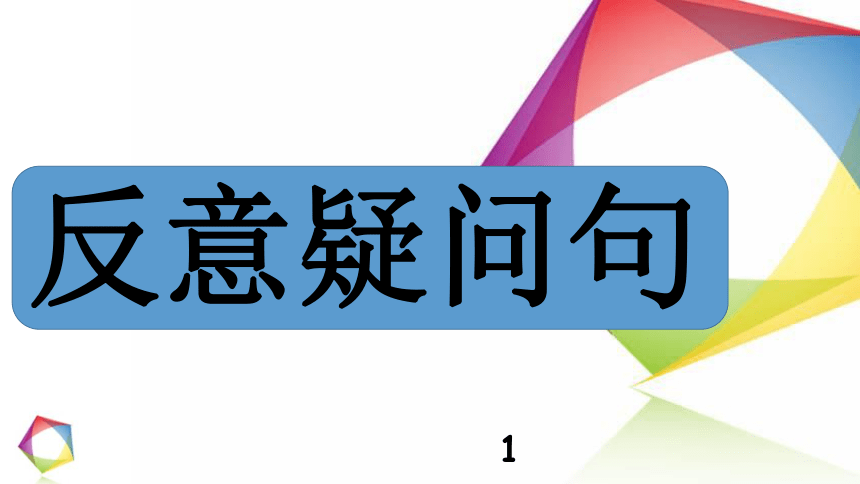 | |
| 格式 | pptx | ||
| 文件大小 | 464.8KB | ||
| 资源类型 | 试卷 | ||
| 版本资源 | 通用版 | ||
| 科目 | 英语 | ||
| 更新时间 | 2022-04-11 14:53:08 | ||
图片预览

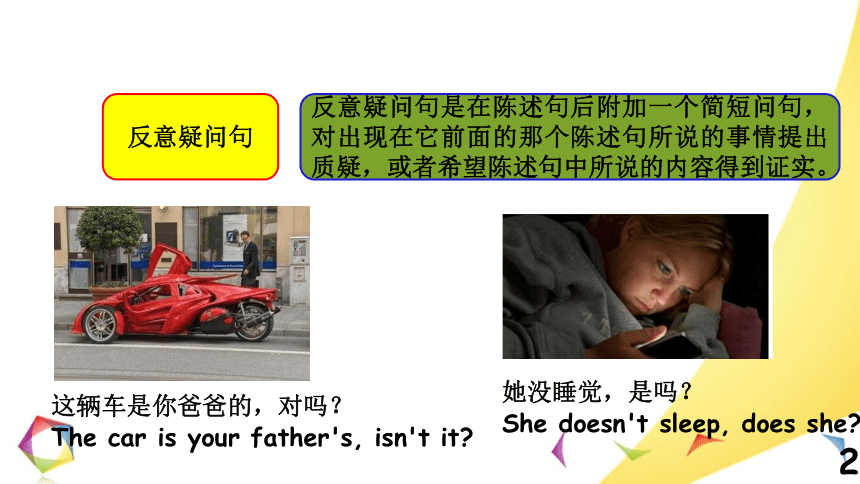
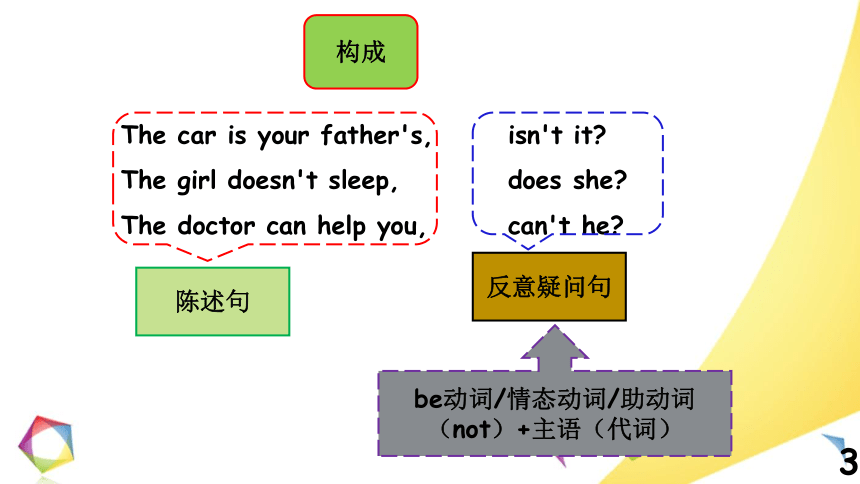
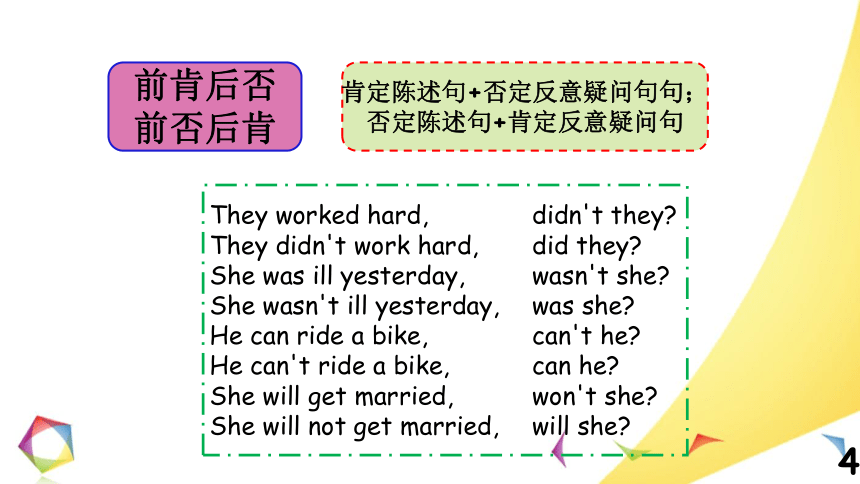
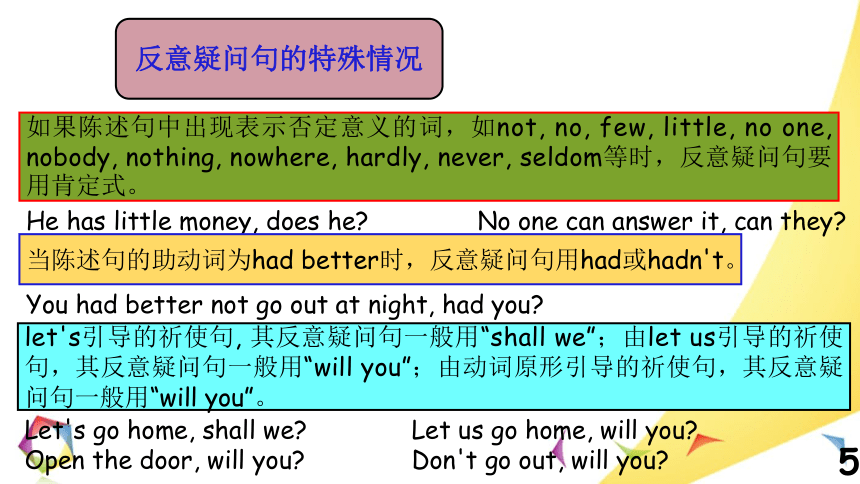
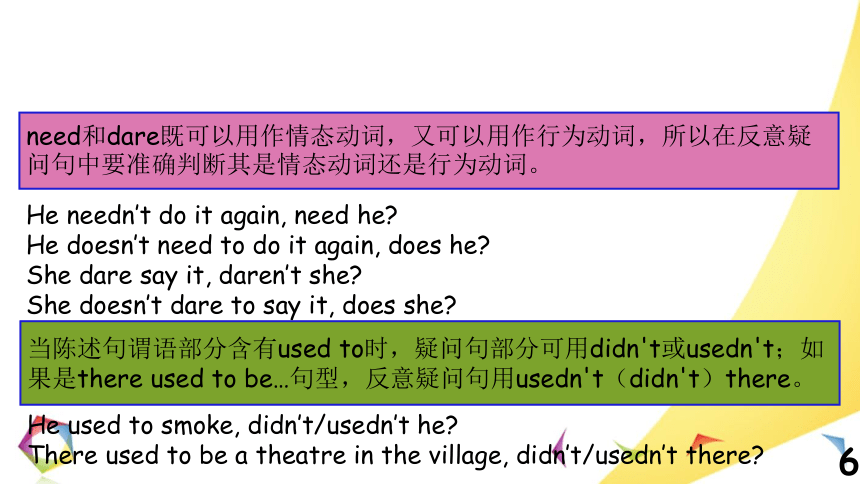
文档简介
(共12张PPT)
反意疑问句这辆车是你爸爸的,对吗?The car is your father's, isn't it 她没睡觉,是吗?She doesn't sleep, does she 反意疑问句反意疑问句是在陈述句后附加一个简短问句,对出现在它前面的那个陈述句所说的事情提出质疑,或者希望陈述句中所说的内容得到证实。构成The car is your father's, isn't it The girl doesn't sleep, does she The doctor can help you, can't he 陈述句反意疑问句be动词/情态动词/助动词(not)+主语(代词)前肯后否前否后肯肯定陈述句+否定反意疑问句句;否定陈述句+肯定反意疑问句They workedhard,didn't they Theydidn'twork hard,didthey She was ill yesterday,wasn't she She wasn't ill yesterday,was she He can ride a bike,can't he He can't ride a bike,can he She will get married,won't she She willnotget married,willshe 反意疑问句的特殊情况如果陈述句中出现表示否定意义的词,如not, no,few,little,no one,nobody,nothing,nowhere,hardly,never,seldom等时,反意疑问句要用肯定式。He has little money,doeshe No one can answer it, canthey 当陈述句的助动词为had better时,反意疑问句用had或hadn't。You had better not go out at night, had you let's引导的祈使句, 其反意疑问句一般用“shall we”;由let us引导的祈使句,其反意疑问句一般用“will you”;由动词原形引导的祈使句,其反意疑问句一般用“will you”。Let's go home, shall we Let us go home, will you Open the door, will you Don't go out, will you need和dare既可以用作情态动词,又可以用作行为动词,所以在反意疑问句中要准确判断其是情态动词还是行为动词。He needn’t do it again, need he He doesn’t need to do it again, does he She dare say it, daren’t she She doesn’t dare to say it, does she 当陈述句谓语部分含有used to时,疑问句部分可用didn't或usedn't;如果是there used to be…句型,反意疑问句用usedn't(didn't)there。He used to smoke, didn’t/usedn’t he There used to be a theatre in the village, didn’t/usedn’t there 陈述句中含有must的反意疑问句构成当must表示“必须”时,反意疑问句的谓语动词用mustn‘t。You must gohome right away, mustn’t you 当mustn’t表示“禁止”时,反意疑问句用must。You mustn’t park your car here, must you 当must表示“猜测、准是”时,反意疑问句谓语视情况用be,do或have等。Yourmothermust be in the kitchen,isn’tshe The scientists must have succeeded in their new experiment, haven't they They must have got there last week, didn't they 当陈述句中的主语为this, that, something, anything, nothing, everything等时,反意疑问句中的主语用it。This is very good, isn't it Somethingis wrong with the machine, isn't it 当陈述句中的主语为these, those,somebody,someone,anybody,anyone,everybody,everyone,nobody,no one,these,those等时,反意疑问句中的主语用they。Somebody knows the secret, don't they Nobody likes it, do they 如果陈述句的否定词带有否定前缀或否定后缀,反意疑问句要用否定式。She is unhappy, isn't she That is useless, isn't it 陈述句部分如果是并列句,附加部分的主语与第二个分句的主谓一致。I go out andyouwillstayat home, won't you Youmust study hard or you can't work well, can you 当陈述句部分含有主从复合句时,反意疑问句根据主句来变。You needn't do itsince he has finished it, need you It's the second time that you have sung that song, isn't it 含有宾语从句的主从复合句,若主句的主语不是第一人称(I或we)时,反意疑问句跟主句变;但是若陈述句为“I/we+think、believe,suppose,expect,feel,imagine,figure等+宾语从句”,反意疑问句跟从句变,如果主句是否定句,反意疑问句要用肯定式,反之亦然。He thinks that it will rain tomorrow, doesn't he I think that it will rain tomorrow, won't it Idon't suppose that the film is moving,is it 反意疑问句的回答对反意疑问句的回答,无论问题的提法如何,如果事实是肯定的,就用yes,事实是否定的,就要用no。要特别注意陈述句部分是否定结构,反意疑问句部分用肯定式提问时,回答yes或no与汉语正好相反。这种省略回答的yes要译成“不”,no要译成“是”。—He likes playing football, doesn't he —Yes, he does. / No, he doesn't.—His sister didn't attend the meeting, did she —Yes, she did. / No, she didn't.
反意疑问句这辆车是你爸爸的,对吗?The car is your father's, isn't it 她没睡觉,是吗?She doesn't sleep, does she 反意疑问句反意疑问句是在陈述句后附加一个简短问句,对出现在它前面的那个陈述句所说的事情提出质疑,或者希望陈述句中所说的内容得到证实。构成The car is your father's, isn't it The girl doesn't sleep, does she The doctor can help you, can't he 陈述句反意疑问句be动词/情态动词/助动词(not)+主语(代词)前肯后否前否后肯肯定陈述句+否定反意疑问句句;否定陈述句+肯定反意疑问句They workedhard,didn't they Theydidn'twork hard,didthey She was ill yesterday,wasn't she She wasn't ill yesterday,was she He can ride a bike,can't he He can't ride a bike,can he She will get married,won't she She willnotget married,willshe 反意疑问句的特殊情况如果陈述句中出现表示否定意义的词,如not, no,few,little,no one,nobody,nothing,nowhere,hardly,never,seldom等时,反意疑问句要用肯定式。He has little money,doeshe No one can answer it, canthey 当陈述句的助动词为had better时,反意疑问句用had或hadn't。You had better not go out at night, had you let's引导的祈使句, 其反意疑问句一般用“shall we”;由let us引导的祈使句,其反意疑问句一般用“will you”;由动词原形引导的祈使句,其反意疑问句一般用“will you”。Let's go home, shall we Let us go home, will you Open the door, will you Don't go out, will you need和dare既可以用作情态动词,又可以用作行为动词,所以在反意疑问句中要准确判断其是情态动词还是行为动词。He needn’t do it again, need he He doesn’t need to do it again, does he She dare say it, daren’t she She doesn’t dare to say it, does she 当陈述句谓语部分含有used to时,疑问句部分可用didn't或usedn't;如果是there used to be…句型,反意疑问句用usedn't(didn't)there。He used to smoke, didn’t/usedn’t he There used to be a theatre in the village, didn’t/usedn’t there 陈述句中含有must的反意疑问句构成当must表示“必须”时,反意疑问句的谓语动词用mustn‘t。You must gohome right away, mustn’t you 当mustn’t表示“禁止”时,反意疑问句用must。You mustn’t park your car here, must you 当must表示“猜测、准是”时,反意疑问句谓语视情况用be,do或have等。Yourmothermust be in the kitchen,isn’tshe The scientists must have succeeded in their new experiment, haven't they They must have got there last week, didn't they 当陈述句中的主语为this, that, something, anything, nothing, everything等时,反意疑问句中的主语用it。This is very good, isn't it Somethingis wrong with the machine, isn't it 当陈述句中的主语为these, those,somebody,someone,anybody,anyone,everybody,everyone,nobody,no one,these,those等时,反意疑问句中的主语用they。Somebody knows the secret, don't they Nobody likes it, do they 如果陈述句的否定词带有否定前缀或否定后缀,反意疑问句要用否定式。She is unhappy, isn't she That is useless, isn't it 陈述句部分如果是并列句,附加部分的主语与第二个分句的主谓一致。I go out andyouwillstayat home, won't you Youmust study hard or you can't work well, can you 当陈述句部分含有主从复合句时,反意疑问句根据主句来变。You needn't do itsince he has finished it, need you It's the second time that you have sung that song, isn't it 含有宾语从句的主从复合句,若主句的主语不是第一人称(I或we)时,反意疑问句跟主句变;但是若陈述句为“I/we+think、believe,suppose,expect,feel,imagine,figure等+宾语从句”,反意疑问句跟从句变,如果主句是否定句,反意疑问句要用肯定式,反之亦然。He thinks that it will rain tomorrow, doesn't he I think that it will rain tomorrow, won't it Idon't suppose that the film is moving,is it 反意疑问句的回答对反意疑问句的回答,无论问题的提法如何,如果事实是肯定的,就用yes,事实是否定的,就要用no。要特别注意陈述句部分是否定结构,反意疑问句部分用肯定式提问时,回答yes或no与汉语正好相反。这种省略回答的yes要译成“不”,no要译成“是”。—He likes playing football, doesn't he —Yes, he does. / No, he doesn't.—His sister didn't attend the meeting, did she —Yes, she did. / No, she didn't.
